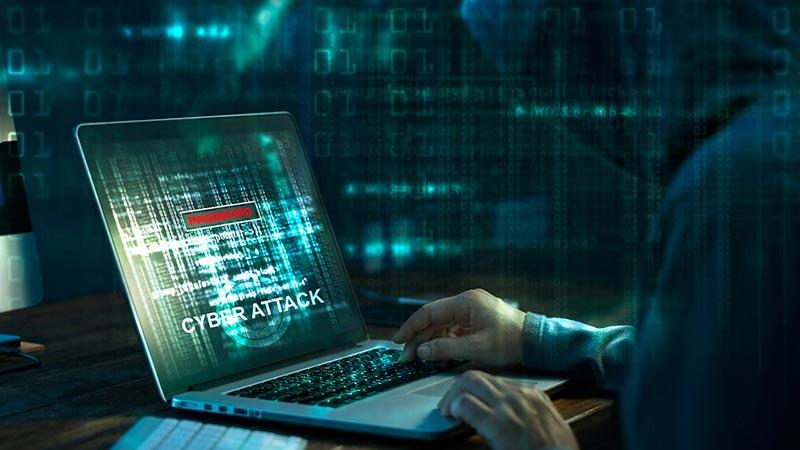What steps is Azerbaijan taking to reduce growing cybersecurity threat? Review by Caliber.Az
In 2020-2021 there was an unprecedented growth of threats to global network security, and the war in Ukraine led to the fact that these processes turned into an open confrontation between the world powers. The noticeably increased global risks also send out a signal to Azerbaijan, which will have to further improve the protection of its cyberspace. New tasks for levelling down the network challenges will be defined in the "Strategy on information security and cyber security of Azerbaijan for 2022-2027" developed by the Ministry of Digital Development and Transport. The recently established Association of Cyber Security Organizations of Azerbaijan (AKTA) will also serve these purposes.
According to researches by the World Economic Forum (WEF), cyberattacks now rank third on the list of global risks after natural and man-made disasters. This is not surprising, because global cybercrime generates about $1.5 trillion in annual revenues for hackers and the "shadow" powerful forces behind them using illegal online markets, IP theft, phishing, etc. Moreover, ransomware hackers are now able to disrupt critical infrastructure such as power grids, oil and gas chemistry, and water purification systems, paralyse civil aviation, and interfere with banking and payment organizations, generally threatening the stable operation of the financial system. All of these poses a serious threat to national security and public safety. In particular, according to the EU Cyber Security Agency (ENISA), the number of cyberattacks on the EU in 2020 increased by three quarters compared to 2019, including about a thousand major cyberattacks on health care, transportation, energy, and other vital areas.

Moreover, methods and practices of global cybercrime and cyber espionage are increasingly being used as a tool for the ideological and military-political struggle between the world's leading powers. China, Russia, North Korea, Iran and a number of South American countries are among states where intelligence services make extensive use of cyber-groups and stimulate "patriotic" activities of hacker groups.
Negative processes in the global cyberspace have further exacerbated this year, and with the outbreak of the war in Ukraine, they have taken the form of a civilizational confrontation. As U.S. President Joe Biden noted in late March, there is a serious cybersecurity threat from Russia against the United States in response to unprecedented economic sanctions for the war waged in Ukraine. Against this backdrop, the White House recently ended its cooperation with the Kremlin through the only permanent channel of communication with Russia, the cybersecurity working group.
"The current scope of cybersecurity threats from China is unprecedented: attacks by Chinese cybercriminals are targeting our innovation, our trade secrets, our intellectual property, on a scale that’s unprecedented in history,” FBI Director Christopher Wray said the previous day during an interview with CBS News. The FBI director also noted the significant threats from Russian cybercrime, which has noticeably intensified due to the war in Ukraine: "Russian hackers continue cyberattacks, as they have done for years, and it is very clear that such online activity will become more disruptive and on a larger scale in the future."

Azerbaijan is also exposed to significant risks due to increasing global cyber threats, and in order to reduce such risks, along with local web security systems in private and public companies, the country has in recent years created special services that successfully prevent cyberattacks on important state Internet resources and protect the computers of the most important civil, defence and industrial systems. In particular, we're talking about the Computer Incident Response Team - Electronic Security Center (CERT) at the State Agency for Special Communications and Information Security of the Special State Security Service. Today, this structure is an effective mechanism for identifying and preventing threats to state Web resources and the Internet space of the country as a whole.
Nevertheless, amid the current problems with global network security, Azerbaijan faces qualitative reform of the regulatory framework in this field and the development of new institutions and mechanisms to protect mass users in the corporate and individual sectors. Such a need was stated recently by Minister of Digital Development and Transport Rashad Nabiyev at the presentation of the newly established "Association of Cyber Security Organizations of Azerbaijan". The minister reminded that the frequency of cyberattacks in the world has increased by almost four times. Earlier, network threats were recorded every 40 seconds, while today they are recorded every 11 seconds. And these negative processes will grow given the increasing number of devices connected to the Internet: if 11 billion devices were connected to the global network in 2016, by 2026 this figure will reach 80 billion. Accordingly, the volume of damage to the global economy from cyberattacks is also increasing; in particular, today it is estimated at an astronomical sum of $6 trillion, which is equivalent to approximately 6% of global GDP.
"The cyber security sector has been included in Azerbaijan's development strategy until 2030, and our agency will provide the necessary support to private companies working in this area. At the same time, it is planned to adopt a new strategy for the development of the Azerbaijani cyber security sector for 2022-2027. In particular, it is planned to make amendments to the legislation in the field of cyber security: there is a need for this, especially because in some cases the activities of some IT companies contradict the current legislation," Nabiyev said.
According to the minister, the strategy’s goals are to transform Azerbaijan "into one of the leading countries in the region and the world in the field of information security." In the meantime, our country ranks 40th in the world on the level of cyber security.
What tasks should be carried out in the field of cybersecurity of Azerbaijan in the coming years, and what role is assigned to the public association AKTA in these processes?
According to the estimates of many international rating structures, Azerbaijan takes a very responsible approach to the implementation of cybersecurity of critical infrastructure. Thanks to the activities of CERT specialists, the level of protection of information systems, databases of government agencies, industrial enterprises, energy and utility facilities and networks, and large entities of the corporate sector is very high. A significant contribution to the protection of the network resources of state bodies is made by large DATA centres created in the country, as well as effective mechanisms introduced at the initiative of the Central Bank to protect the confidential information of the banking sector and payment systems. These efforts have not gone unnoticed by the world profile structures, and in the global cybersecurity rating - Global Cybersecurity Index: rising by 15 positions, Azerbaijan ranks 40th among 194 countries of the world, noticeably ahead of a number of states in Europe and the post-Soviet region.

However, according to the Ministry of Digital Development and Transport, the process of mass digitalization at the global level poses a number of challenges to Azerbaijani society. First of all, this is necessary for forming a society that is ready for cyberattacks.
Alas, in Azerbaijan, as in most post-Soviet countries, ordinary users remain in the zone of serious risk, increasingly faced with network threats and vulnerabilities, which have intensified worldwide since the beginning of coronavirus. In the post-pandemic period, many corporate employees still work from home, exchanging data with the office via personal computers over the home Internet, and this has increased the threat of data loss or attacks on corporate sector servers. Freelancers, representatives of the IT business, numerous participants in e-commerce and e-services, media representatives - in short, everyone who works and provides services outside of corporate networks controlled by experienced IT administrators - all face the same risks. Unfortunately, home computers and networks are in most cases poorly protected and easily hacked by attackers. Thus, bank accounts and card data, photo and video files, and other corporate files of companies are compromised. Moreover, through the laptops of office workers, hackers can get access passwords to corporate email, the "admin area", and even infect company servers with viruses.

Therefore, in order to improve the network literacy and protection of the society, in the future, AKTA specialists will have to make efforts in the format of educational and informational work, covering primarily the protection of individual and public network segments from cyber threats, including the popularization of more secure cloud services for database storage, use of other services and services of DATA centres, implementation of advanced antivirus protection means, etc.
Another important task of AKTA is to inform the corporate and public sectors about scientific and technological advances in cybersecurity, as well as to support domestic startups, and software companies conducting research on the development or implementation of international products in the field of network security.
In this context, the information and organizational support of AKTA specialists for the training and internship of professional staff in the field of network security would be in high demand in the future. The urgency of this problem today is extremely high. The country needs a much larger number of IT specialists, including those in the field of security. Thus, Microsoft Azerbaijan believes that lyceums and schools with in-depth studies of cybersecurity should be created in the country, and centres of competence in this area should be formed. Similar measures are already being implemented by the Ministry of Education. Thus, according to Education Minister Emin Amrullayev, the number of places for applicants for the bachelor's degree in IT for the academic year 2022-2023 will be 3,750, which is 1.9 times more than in the 2017-2018 academic year. In turn, today among the total number of vacancies for those wishing to study abroad at the expense of the state, 25% is reserved for students who are ready to choose the field of information and communication technologies as their career.

AKTA is also responsible for the protection of national interests, combating online disinformation, and aspects of network protection of national information resources.
It should be noted that the most frequent attacks by hackers are against Azerbaijani electronic media and websites of government agencies: one-fifth of all attempts of unauthorized access to the country's information resources are related to the activity of Armenian cybercrime groups. Over the past decade, especially after the fighting of April 2016, the border clashes of July 2020 and the 44-day Patriotic War, attacks on Azerbaijani online resources have been scaled up and conducted according to coordinated schemes: DDoS attacks, blocking websites and other information platforms, hacking databases, manipulation of social networks' user credentials and e-mails. And this is not a complete list of crimes committed by Armenian hackers in recent years. Such attacks are successfully suppressed, and work to prevent such criminal activity is strongly coordinated by specialists of CERT and the State Security Service of Azerbaijan.
In the future, it would be the best way for AKTA to participate in the field of increasing the security of electronic media and other public information resources in Azerbaijan. For example, the organization of seminars and other educational forums aimed at improving the literacy of system administrators and cybersecurity specialists, encouraging information recourses to implement the most advanced security programs and mechanisms, etc.








